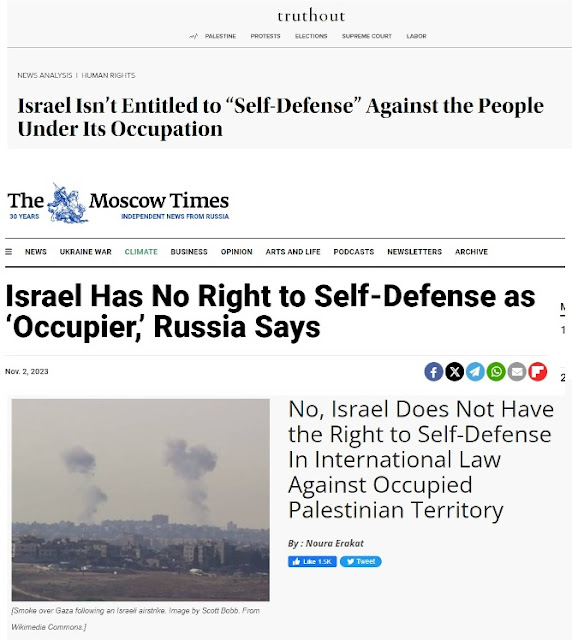ON ISRAEL's #SelfDefenseUnder Int'l Law Israel's actions in Gaza cannot qualify as self-defenseIn int'l law, Self-Defense is a term of art, with a narrower meaning than in common language.Under Article 51 of UN Charter, self-defense means :(1) legitimate use of force(2) by a state to protect itself against an attack(3) from another state.Under Article 51, use of force in self-defense is permissible solely to repel an armed attack by another State. Threats from armed groups from within occupied territory give state the RIGHT TO PROTECT ITSELF, but not to wage war against the state from which the armed group emanates.In line with established ICJ jurisprudence, in the case of the oPt: Israel cannot invoke the right to Self Defense under the UN Charter against threats emanating from the territory it occupies, and against the protected [Palestinian] population (ICJ, 2004).
The fact remains that Israel has to face numerous indiscriminate and deadly acts of violence against its civilian population. It has the right, and indeed the duty, to respond in order to protect the life of its citizens.
Israel's duty to defend its citizens and residents, even if they are in the area, is anchored in internal Israeli law. The legality of the implementation of this duty is anchored in public international law, as discussed, in the provisions of regulation 43of The Hague Regulations. In The Beit Sourik Case, this Court did not anchor the military commander's authority to erect the separation fence upon the law of self defense. The Advisory Opinion of the International Court of Justice at the Hague determined that the authority to erect the fence is not to be based upon the law of self defense. The reason for this is that §51 of the Charter of the United Nations recognizes the natural right of self defense, when one state militarily attacks another state. Since Israel is not claiming that the source of the attack upon her is a foreign state, there is no application of this provision regarding the erection of the wall (paragraph 138 of the Advisory Opinion of the International Court of Justice at the Hague). Nor does the right of a state to self defense against international terrorism authorize Israel to employ the law of self defense against terrorism coming from the area, as such terrorism is not international, rather originates in territory controlled by Israel by belligerent occupation. This approach of the International Court of Justice at the Hague is not indubitable (many sources given - EoZ). It stirred criticism both from the dissenting judge, Judge Buergenthal (paragraph 6) and in the separate opinion of Judge Higgins (paragraphs 33 and 34). .... We find this approach of the International Court of Justice hard to come to terms with. It is not called for by the language of §51 of the Charter of the United Nations (see the difference between the English and French versions, S. Rosenne 291 General Course on Public International Law 149 (2001)). It is doubtful whether it fits the needs of democracy in its struggle against terrorism. From the point of view of a state's right to self defense, what difference does it make if a terrorist attack against it comes from another country or from territory external to it which is under belligerent occupation? And what shall be the status of international terrorism which penetrates into territory under belligerent occupation, while being launched from that territory by international terrorism's local agents? As mentioned, we have no need to thoroughly examine this issue, as we have found that regulation 43 of The Hague Regulations authorizes the military commander to take all necessary action to preserve security. The acts which self defense permits are surely included within such action. We shall, therefore, leave the examination of self defense for a future opportunity.
The confrontation between Israel and these terrorist organisations in the Gaza Strip satisfies the definition of armed conflict under international law. The 2014 Gaza Conflict was simply the latest in a series of armed confrontations, precipitated by the continuing attacks perpetrated by Hamas and other terrorist organisations against Israel. After previous periods of intense fighting (including in 2009 and 2012), Hamas agreed to ceasefires, each of which it later breached, leading to Israel’s resumption of responsive military action to defend its population from attacks. Hamas’s attacks leading up to the 2014 Gaza Conflict were thus part of a larger, ongoing armed conflict. But even if one were not to consider the 2014 Gaza Conflict part of a continuous armed conflict justifying Israel’s use of force both previously and during this time, Hamas’s armed attacks against Israel in 2014 would independently qualify as an armed attack triggering Israel’s inherent right of self-defence.
|
Or order from your favorite bookseller, using ISBN 9798985708424. Read all about it here! |

|

 Elder of Ziyon
Elder of Ziyon























